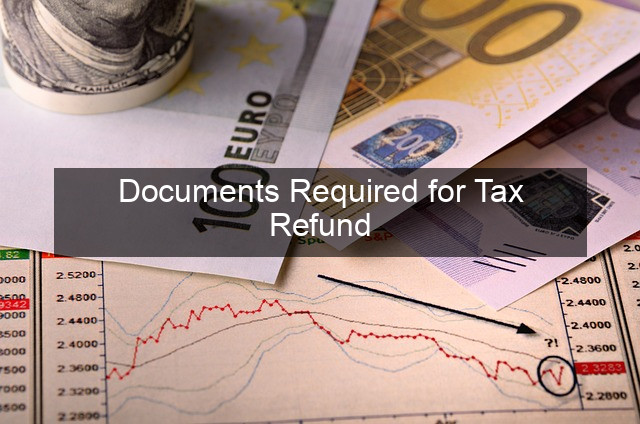Documents Required for Tax Refund
- Documents Required for Tax Refund
- Claim Your Tax Refund: Essential Documents You Need
- Income Documentation: The Foundation of Your Return
- W-2 Forms: Reporting Wages and Salaries
- 1099 Forms: Reporting Non-Employee Income
- Other Income Documentation: Covering All Your Bases
- Deductions and Credits: Maximizing Your Refund
- Itemized Deductions: Going Beyond the Standard Deduction
- Tax Credits: Direct Reductions in Your Tax Bill
- Supporting Documentation: Proving Your Eligibility
- Additional Documentation: Special Circumstances and Situations
- Self-Employment Documentation: Tracking Income and Expenses
- Rental Property Documentation: Managing Income and Deductions
- Other Situations: Addressing Unique Circumstances
- Conclusion: Be Prepared and Claim Your Refund
- Frequently Asked Questions (FAQ)

Claim Your Tax Refund: Essential Documents You Need
Tax season can be daunting. Many individuals find the process of filing taxes and claiming refunds complex and overwhelming. Understanding the required documentation is crucial for a smooth and successful refund process. This comprehensive guide outlines the essential documents you need to gather to maximize your refund and minimize potential headaches. We’ll cover everything from standard forms like W-2s and 1099s to more specialized documentation for specific deductions and credits. By being prepared and organized, you can navigate the tax season with confidence and ensure you receive the refund you deserve. Don’t leave money on the table – let’s get started!
Income Documentation: The Foundation of Your Return
W-2 Forms: Reporting Wages and Salaries
Your W-2 form is issued by your employer and details your annual wages and the taxes withheld. It’s a critical document for accurately reporting your income to the IRS. Ensure you receive a W-2 from each employer you worked for during the tax year.
Carefully review your W-2 for accuracy. Discrepancies can lead to delays in processing your refund. If you notice any errors, contact your employer immediately for a corrected form.
Keep your W-2s in a safe place. You’ll need them not only for filing your taxes but also for other financial purposes, such as applying for a loan or renting an apartment.
1099 Forms: Reporting Non-Employee Income
If you’re a freelancer, independent contractor, or receive income from sources other than an employer, you’ll likely receive a 1099 form. There are various types of 1099s, such as 1099-NEC for non-employee compensation, 1099-INT for interest income, and 1099-DIV for dividends.
Each 1099 form reports a specific type of income. Make sure you have all the necessary 1099s to accurately reflect your earnings.
Similar to W-2s, review your 1099s for accuracy and contact the payer if you find any errors. Accurate reporting is key to a smooth tax filing process.
Other Income Documentation: Covering All Your Bases
Beyond W-2s and 1099s, other income sources may require specific documentation. This could include unemployment compensation, Social Security benefits, or income from rental properties.
For unemployment benefits, you’ll receive a 1099-G form. Social Security benefits are reported on Form SSA-1099. Rental income requires detailed records of income and expenses.
Gathering all necessary income documentation ensures a comprehensive and accurate tax return. This minimizes the risk of audits and maximizes your potential refund.
Deductions and Credits: Maximizing Your Refund
Itemized Deductions: Going Beyond the Standard Deduction
Itemized deductions allow you to deduct specific expenses, potentially lowering your taxable income. These deductions may include medical expenses, state and local taxes, charitable contributions, and mortgage interest.
Keep meticulous records of these expenses throughout the year. Receipts, bank statements, and other supporting documents are vital for substantiating your claims.
Determine if itemizing is beneficial. Compare your potential itemized deductions to the standard deduction to see which option results in a lower tax liability.
Tax Credits: Direct Reductions in Your Tax Bill
Tax credits directly reduce the amount of tax you owe. They are often more valuable than deductions. Common credits include the Earned Income Tax Credit, Child Tax Credit, and education credits.
Eligibility requirements vary for each credit. Understand the specific criteria and gather the necessary documentation to support your claim.
Claiming eligible credits can significantly impact your refund. Explore available credits and ensure you have the required documentation to take advantage of them.
Supporting Documentation: Proving Your Eligibility
Regardless of the deduction or credit you’re claiming, supporting documentation is essential. This may include receipts, invoices, medical bills, or other relevant records.
Organize your documents. A well-organized system will make the tax filing process smoother and reduce the risk of overlooking important information.
Maintaining accurate records throughout the year simplifies the process of gathering documentation during tax season. This proactive approach can save you time and stress.
Additional Documentation: Special Circumstances and Situations
Self-Employment Documentation: Tracking Income and Expenses
If you’re self-employed, meticulous record-keeping is paramount. Track all income and business-related expenses.
Maintain separate bank accounts and credit cards for business transactions. This simplifies tracking and provides clear documentation for tax purposes.
Consider using accounting software. This can streamline the process of tracking income and expenses and generating reports for tax filing.
Rental Property Documentation: Managing Income and Deductions
Owning rental property requires detailed documentation of income and expenses. Track rental income, mortgage interest, property taxes, repairs, and other related costs.
Maintain separate records for each property. This ensures accurate reporting and simplifies tax preparation.
Consult with a tax professional. Navigating the complexities of rental property taxes can be challenging, and professional guidance can be invaluable.
Other Situations: Addressing Unique Circumstances
Certain life events, such as marriage, divorce, or the birth of a child, may require additional documentation for tax purposes.
Consult the IRS website or a tax professional. They can provide guidance on the specific documentation needed for your situation.
Being aware of these requirements ensures you’re prepared and can file your taxes accurately.
Conclusion: Be Prepared and Claim Your Refund
Gathering the necessary documents for your tax refund doesn’t have to be a stressful experience. By understanding the required documentation and organizing your records throughout the year, you can streamline the process and maximize your refund. Remember to keep accurate records of your income, expenses, and any supporting documentation for deductions and credits. This proactive approach will not only simplify tax filing but also empower you to claim the full refund you deserve. Don’t hesitate to consult with a tax professional if you have complex tax situations or require personalized guidance. Being informed and organized is the key to a successful tax season.
Frequently Asked Questions (FAQ)
- Where can I find my tax forms? You can find tax forms on the IRS website (www.irs.gov) or through tax preparation software.
- What if I’m missing a W-2 form? Contact your employer immediately to request a copy of your missing W-2.
- Can I file my taxes electronically? Yes, you can file your taxes electronically using tax preparation software or through a tax professional.
- What is the difference between a deduction and a credit? A deduction reduces your taxable income, while a credit directly reduces the amount of tax you owe.
- When is the tax deadline? The tax deadline is typically April 15th, but it may vary depending on weekends and holidays.
- Where can I get help with my taxes? You can find free tax assistance programs, consult with a tax professional, or use IRS resources.
| Document | Purpose |
|---|---|
| W-2 | Reports wages and salaries |
| 1099 | Reports non-employee income |
| 1098 | Reports mortgage interest |




